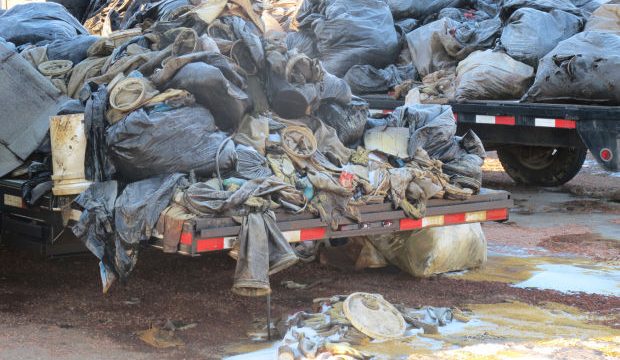When Environmentalists Obstruct Solutions To Environmental Problems

Very often I get the feeling that environmental groups care far less about the environment than they do about advancing certain political agendas. Case in point, the battle over NORM (or naturally occurring radioactive material) which is a byproduct of oil development in North Dakota.
Jay Almlie, Senior Research Manager at the University of North Dakota’s Energy & Environmental Research Center, had a great op/ed about NORM waste from oil drilling in North Dakota here on SAB earlier this year. Calling anything “radioactive” makes it sound really scary, but this stuff is relatively benign.
But that’s not to say it’s completely safe. It’s not, and it should be disposed of properly. Unfortunately, over the past year or so, the state has had some problems with illegal dumping of filter socks which have a low-grade of radioactivity about them after being used in drilling operations. An abandoned building near Noonan, North Dakota, was found stuffed with illegally dumped and radioactive filter socks. Trailers carrying radioactive filter socks were found parked right out in the open in Watford City (see photo above).
These incidents created plenty of negative attention, and calls from action from environmental groups such as the left-wing Dakota Resource Council and the North Dakota Energy Industry Waste Coalition which is headed by Darrell Dorgan, brother to former U.S. Senator Byron Dorgan.
The North Dakota Industrial Commission responded by mandating that all drilling sites have disposal containers serviced by licensed waste management contractors. The state’s inspectors are ensuring that these containers are being utilized properly. To my knowledge, there hasn’t been an incident of illegal dumping since.
The other step state leaders want to take is easing the restriction on disposing radioactive material in the state. Currently the state does not allow the disposal of any material radioactive beyond 5 picocuries, which is absurdly low (Almlie pointed out that your home’s granite countertops may actually be more radioactive than that). The state would like to raise it to 50 picocuries, which is higher than the 30 picocuries limit in Montana and Minnesota but much lower than the limits in Colorado (2,000), Idaho (1,500) and Utah and Washington (10,000).
This makes sense. If this material is going to be produced in North Dakota there should be a method by which it can be disposed of safely in North Dakota. The fact that there is no legal way to dispose of it here, other than shipping it out of state, likely contributed to the original dumping problem.
You can read the proposed rule changes here. The Department of Health has more information, including the study upon which this proposal is based, here.
But Dorgan and his fellow environmental zealots at the DRC are having none of this common sense reform to existing laws, as Mike Nowatzki reports:
…Dorgan said it’s not low enough.
“What the health department wants to do is allow the dumping of radioactive waste in North Dakota that’s tenfold higher what you get hit with at the dentist’s office, and not require the lead apron,” he said. …
Dorgan and Dakota Resource Council member Theodora Bird Bear both suggested the oil industry has too much influence on the health department. They’re not confident the department can track the technologically enhanced naturally occurring radioactive material, or TENORM, from “cradle to grave” as it has proposed.
Under the proposed rules, haulers licensed by the department’s radiation control program would need to have a trained radiation safety officer and submit quarterly reports with signed manifests showing where, when and how much waste was picked up and delivered to the landfill.
“They are unable to track waste now. I guess I don’t see how they can do it at a tenfold level,” Bird Bear said.
See what I mean?
A problem with dumping radioactive material arises. These activists complain, rightfully since that dumping shouldn’t have been happening, but when the state acts to solve the problem the move the goalposts.
Because let’s face it: These people would rather regulate oil and gas development out of existence. I don’t think there is any level of regulation (or taxation, for that matter) for oil and gas development that would be enough for these people. Nothing short of a de facto ban on oil and gas development will satisfy them.
Which is a shame. We need to be having a robust debate about balancing oil and gas development with property rights and environmental impacts. But political extremists and their bomb throwing obscure that debate.




